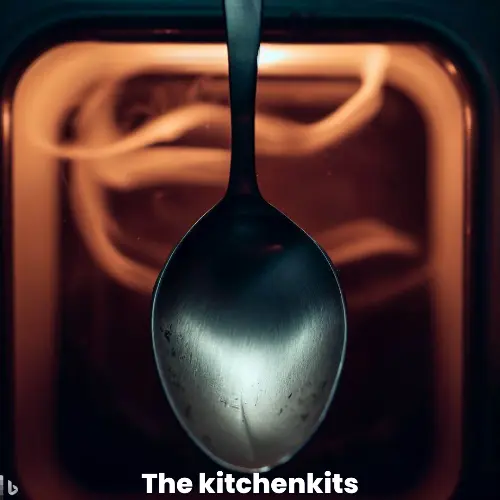Thekitchenkits.online is an Amazon Associate and earns from qualifying purchases made through affiliate links on our site at no extra cost to you. This supports our efforts to bring you valuable kitchen-related content.
Table of Contents
Should You Put a Metal Spoon in the Microwave?
It is not recommended to put a metal spoon in the microwave. Putting a metal spoon in the microwave may seem harmless, but it can be hazardous.
In this article, we’ll dive into why you should never put a metal spoon or other metal objects in the microwave and the potential dangers associated with doing so.
Why You Should Never Put a Metal Spoon in the Microwave
Putting metal into a microwave oven can lead to sparks, electric arcing, and even fires. The electromagnetic waves inside the microwave interact with the metal and cause electrons on the metal’s surface to hurry. This leads to superheating and sparks that can damage the microwave or ignite nearby objects.
While all metal should be kept out, metal spoons are especially problematic. Their narrow shafts and sharp edges make them likely to cause sparks and heating problems in the confined space of the microwave. Even utensils made from so-called “microwave-safe” metals can cause issues if misused. Put, metal and microwaves don’t mix.
Can Sparks and Fires Happen from Just a Spoon?
Yes, it may seem hard to believe, but even a single spoon left in the microwave can create dangerous sparks and arcing. The metal spoon acts as an antenna, concentrating the microwave’s energy. This causes rapid superheating at the spoon’s edges and tip, which can ignite food or paper products in the microwave.
If the spoon is in a cup of liquid when microwaved, the water may boil violently and explode out of the container. The fluid can reach extreme temperatures well above boiling point due to the focused energy on the spoon.
So Why Are Microwave Walls Safe But Spoons Aren’t?
The critical difference is microwaves are designed to contain and deflect energy safely. The walls have rounded corners and lack sharp points that would cause sparks. Metals like spoons and forks have edges and tips that convert microwaves into hotspots.
Dangers and Consequences of Microwaving Metal
Now that we’ve established why metal and microwaves don’t mix let’s look at some specific dangers that can occur if you put a spoon or other metal in the microwave:
- Sparks, arcing, and fires – these immediate dangers can burn the microwave or spread flames
- Superheated food and liquids – explosively boiling water is a hazard
- Smoke and release of toxic fumes from melting metals
- Permanent damage to the microwave, including the circuitry
- Risk of exposure to radiation leaks if the metal damages the shielding
- Possibility of severe burns if removing superheated metals/food
The consequences here range from destroying your microwave to burning your entire home. Simply put, the risks are not worth taking to save time, not removing a spoon.
What About Just “Quickly” Heating Leftover Food With Metal In It?
Many folks know not to microwave just a bare spoon but still ask if it’s safe to quickly reheat leftover food with metal cutlery already in the container. The answer is still no.
The dangers are reduced but still present. The metal utensils can arc to the sides or concentrate heat in one spot. It’s still possible for fires to occur. For safe reheating, permanently remove metal items first.
Microwaving Other Metal Items: Foil, Cutlery, Etc
While our focus has been on metal spoons, other types of metal should never be microwaved, either. Here are a few examples:
- Aluminium foil – can ignite easily and lead to a severe fire
- Forks and knives – the tines/edges concentrate energy
- Crumpled foil – doubles as an antenna to intensify hotspots
- Lids with metal trim – watch for all-metal lids and rings
- Dishes with metal paint or decor – safer to keep these out
In general, use microwave-safe cookware only and avoid any metal. Check labels to confirm cookware is fully microwaveable before using. Again, removing metal items takes only seconds and can prevent disaster.
FAQs
Can I put a metal spoon in the microwave?
No, putting a metal spoon in the microwave is unsafe. Metal can cause sparks and lead to a fire hazard. It can also damage the microwave and cause it to malfunction.
Why is it not safe to put metal in a microwave?
Metal in a microwave can create a phenomenon called “arcing,” where sparks are generated. This is because the microwaves bounce off the metal and cause an electrical discharge. This can damage the microwave and potentially cause a fire.
What happens if I accidentally put aluminium foil in the microwave?
If you accidentally put aluminium foil in the microwave, it can cause a fire. The foil can create sparks and arcing, leading to dangerous situations. It is essential to permanently remove any metal objects before using your microwave.
Is it safe to put a metal fork in the microwave?
No, putting a metal fork in the microwave is unsafe. Like a metal spoon, a metal fork can cause sparks and lead to a fire hazard. It is best to use microwave-safe utensils made of plastic or glass.
Can I use cookware labelled as “oven safe” in the microwave?
While cookware labelled “oven safe” can withstand high temperatures in the oven, it does not necessarily mean it is safe to use in the microwave. Microwaves work differently from ranges; certain materials, including metal, can still cause sparks and arcing in the microwave.
Is it safe to put a spoon in a cup and microwave it?
Yes, it is generally safe to put a spoon in a cup and microwave it if the scoop is made of microwave-safe material such as plastic or glass. However, checking the manufacturer’s recommendations for specific utensils is always a good idea.
Can I put a metal spoon in the microwave if immersed in liquid?
It is still unsafe to put a metal spoon in the microwave, even if it is completely immersed in liquid. The proximity of the metal to another metal surface, such as the walls of the microwave, can still cause sparks and arcing.
What should I do if I accidentally microwave food with a metal spoon?
If you accidentally microwave food with a metal spoon, it is essential to turn off the microwave and remove the metal spoon immediately. Inspect the fare for any damage or signs of burning. Do not consume the food if it appears to be contaminated or compromised.
I left a metal spoon in the microwave while cooking. Is it safe to use the microwave again?
If you left a metal spoon in the microwave while it was operating, it is recommended to inspect the microwave for any signs of damage or burning. In most cases, the microwave should be safe to use again if there are no visible issues.
However, it is always a good idea to err on the side of caution and have a professional inspect it if you have any concerns.
Can I put metal into a microwave if it is microwave-safe?
The term “microwave-safe” generally refers to materials that do not interact with microwaves and can withstand their heat. While microwave-safe metals are available, putting metal into a microwave is still not recommended. It is best to use microwave-safe utensils made of plastic or glass.
Key Takeaways to Remember
To recap, here are some critical tips regarding metal in the microwave:
- Never put forks, spoons, knives, or other metal in the microwave
- Permanently remove foil and metal lids/trivets before heating
- Don’t use metal cookware or dishes unless labeled microwave-safe
- Liquids can superheat and boil violently with metal inside
- Sparks and fires are real risks even from “quick” heating
- Microwaves concentrate energy on metal edges and points
Following basic precautions lets you enjoy safe, convenient cooking in your microwave. When in doubt, keep the metal out! Don’t let convenience put your safety at risk.
Final Thoughts
While microwaving a metal spoon may seem harmless, doing so can lead to dangerous situations, including damage, sparks and even fires. Permanently remove metal items before operating your microwave. Take the few seconds required to keep kitchen safety top of mind. Don’t let speed and convenience endanger your home and family. Stay safe – leave the spoons for the table, not the microwave!

I’m Ian Welkins, a seasoned professional in the kitchen industry. My passion now drives me to provide invaluable insights into the world of top-notch kitchen products. With years of hands-on experience, I’m your go-to source for culinary excellence.


